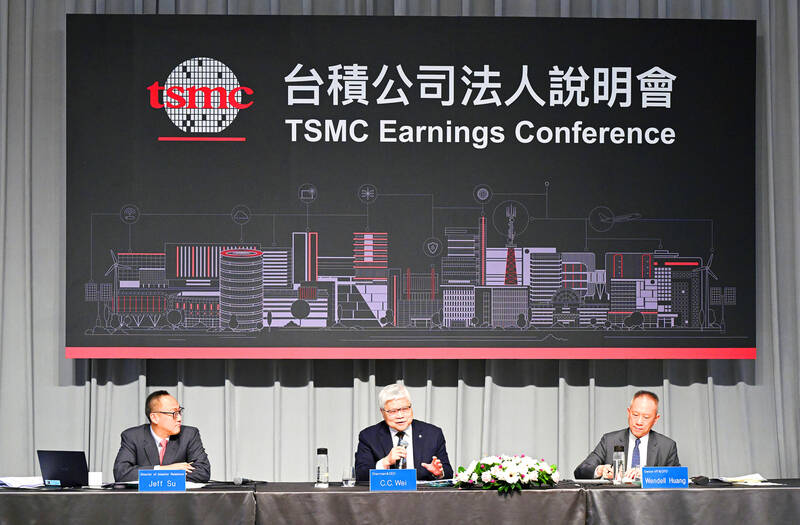Taiwan Semiconductor Manufacturing Co (TSMC, 台積電) yesterday increased its projected revenue growth for this year to above 25 percent, as stronger-than-expected demand for premium smartphones and artificial intelligence (AI) devices are to drive greater utilization of cutting-edge 3-nanometer and 5-nanometer chips.
In April TSMC estimated 21 to 24 percent annual growth.
The firm’s revenue growth is on track to greatly outpace the global foundry industry, which is expected to rise about 10 percent this year.

Photo: Liao Chen-hui, Taipei Times
“Over the past three months, we have observed stronger AI and high-end smartphone demand from our customers, which is to boost the overall capacity utilization for our leading-edge 3-nanometer and 5-nanometer technologies in the second half of 2024,” TSMC chairman and CEO C.C. Wei (魏哲家) told an investors’ conference in Taipei yesterday. “Thus, we continue to expect 2024 to be a strong growth year for TSMC.”
TSMC hiked its capital expenditure budget for this year to between US$30 billion and US$32 billion, compared with an earlier expectation that it would be US$28 billion to US$32 billion.
Up to 80 percent of the new budget would be for advanced process technologies, it said.
TSMC expects 3-nanometer and 5-nanometer capacity to be tight this year and through next year, as most customers are trying to pack their devices with AI functions, Wei said.
Advanced packing capacity would continue to be constrained through next year, even though TSMC plans to more than double its chip-on-wafer-on-substrate capacity next year, he said.
For this quarter, TSMC expects revenue to reach an all-time high, expanding by 7.59 percent to 11.43 percent sequentially to between US$22.4 billion and US$23.2 billion compared with US$20.82 billion last quarter.
About half of TSMC’s revenue last quarter came from 3-nanometer and 5-nanometer chips, which were primarily used in AI applications and high-performance computing devices, it said.
“Moving into the third quarter, we expect our business to be supported by smartphone and AI demand for our leading-edge process technologies,” Wei said.
Gross margin is expected to improve further from 53.2 percent last quarter to between 53.5 percent and 55.5 percent this quarter, largely due to improved factory utilization, TSMC said.
The chipmaker maintained its long-term gross margin target at more than 53 percent, given mounting manufacturing costs, mainly from overseas fabs.
With two new fabs in Arizona and Kumamoto, Japan, to commence operations next year, gross margin would go down by 2 to 3 percentage points, it said.
Regarding former US president Donald Trump’s remarks that Taiwan took chip business from the US, Wei said that TSMC would stand pat on its global expansion strategy with ongoing projects in the US, Japan and Europe.
The chipmaker has no plans to form joint ventures to accelerate overseas capacity expansion, he added.
In the April-to-June quarter, TSMC’s net profit was NT$247.85 billion (US$7.6 billion), up 36.3 percent from NT$181.8 billion a year earlier and 9.9 percent from NT$225.49 billion in the previous quarter.
Earnings per share rose from NT$7.01 a year earlier and NT$8.7 a prior quarter to NT$9.56.
Operating margin rose from 42 percent a year earlier and the previous quarter to 42.5 percent, while operating margin surpassed the chipmaker’s guidance of 40 to 42 percent.

Macronix International Co (旺宏), the world’s biggest NOR flash memory supplier, yesterday said it would spend NT$22 billion (US$699.1 million) on capacity expansion this year to increase its production of mid-to-low-density memory chips as the world’s major memorychip suppliers are phasing out the market. The company said its planned capital expenditures are about 11 times higher than the NT$1.8 billion it spent on new facilities and equipment last year. A majority of this year’s outlay would be allocated to step up capacity of multi-level cell (MLC) NAND flash memory chips, which are used in embedded multimedia cards (eMMC), a managed

CULPRITS: Factors that affected the slip included falling global crude oil prices, wait-and-see consumer attitudes due to US tariffs and a different Lunar New Year holiday schedule Taiwan’s retail sales ended a nine-year growth streak last year, slipping 0.2 percent from a year earlier as uncertainty over US tariff policies affected demand for durable goods, data released on Friday by the Ministry of Economic Affairs showed. Last year’s retail sales totaled NT$4.84 trillion (US$153.27 billion), down about NT$9.5 billion, or 0.2 percent, from 2024. Despite the decline, the figure was still the second-highest annual sales total on record. Ministry statistics department deputy head Chen Yu-fang (陳玉芳) said sales of cars, motorcycles and related products, which accounted for 17.4 percent of total retail rales last year, fell NT$68.1 billion, or

In the wake of strong global demand for AI applications, Taiwan’s export-oriented economy accelerated with the composite index of economic indicators flashing the first “red” light in December for one year, indicating the economy is in booming mode, the National Development Council (NDC) said yesterday. Moreover, the index of leading indicators, which gauges the potential state of the economy over the next six months, also moved higher in December amid growing optimism over the outlook, the NDC said. In December, the index of economic indicators rose one point from a month earlier to 38, at the lower end of the “red” light.

MediaTek Inc (聯發科) shares yesterday notched their best two-day rally on record, as investors flock to the Taiwanese chip designer on excitement over its tie-up with Google. The Taipei-listed stock jumped 8.59 percent, capping a two-session surge of 19 percent and closing at a fresh all-time high of NT$1,770. That extended a two-month rally on growing awareness of MediaTek’s work on Google’s tensor processing units (TPUs), which are chips used in artificial intelligence (AI) applications. It also highlights how fund managers faced with single-stock limits on their holding of market titan Taiwan Semiconductor Manufacturing Co (TSMC, 台積電) are diversifying into other AI-related firms.